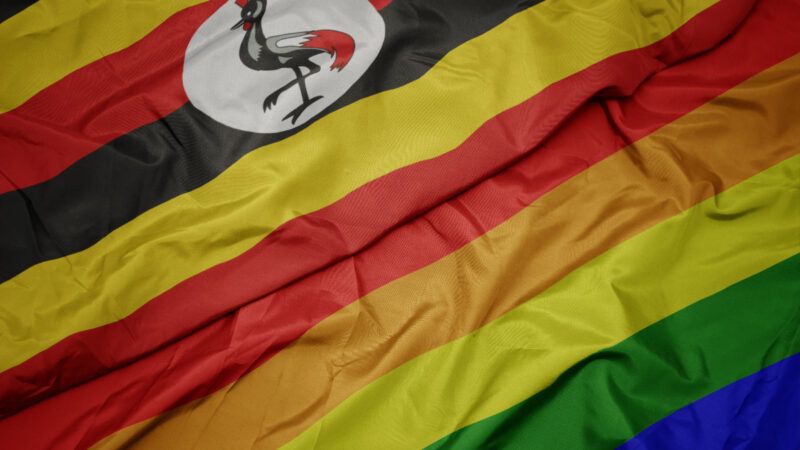Uganda's New Anti-Gay Law Could Undermine AIDS Prevention
The new law dictates a life sentence for anyone caught having gay sex and the death penalty for anyone convicted of "aggravated homosexuality."

Ugandan President Yoweri Museveni this week signed into law his country's most aggressive assault yet on the rights of Uganda's LGBT community. The Anti-Homosexuality Bill dictates a life sentence for anyone caught having gay sex and the death penalty for anyone convicted of "aggravated homosexuality," a term that encompasses sex with minors or sex that results in the transfer of sexually transmitted infections, such as HIV. Furthermore, the law says anyone who "promotes homosexuality" be sentenced to up to 20 years in prison in a "vaguely worded" provision that puts activists and public health advocates at risk.
One of the most severe anti-gay bills in the world, it marks the culmination of years of legislative efforts to set sentencing requirements for those convicted of same-sex relations. A similar bill passed in 2014 but was ruled unconstitutional by a Ugandan court on procedural grounds.
Same-sex relations have been illegal in Uganda since British colonial times under sections in the penal code discussing "unnatural offenses" and "indecent practices," but now the Parliament has solidified harsh penalties.
The law conveys Uganda's desire to protect the traditional family by "strengthening the nation's capacity to deal with emerging internal and external threats to the traditional, heterosexual family," mirroring rhetoric that portrays same-sex relations as unnatural and a threat to tradition.
Museveni painted homosexuality as a "deviation from normal" and told policy makers to not fall prey to "imperialist" pressure. One member of Parliament suggested that "if we don't stand our ground as a country… then we will completely have ceded our sovereignty." The Parliament speaker welcomed the provision, stating, "We have stood strong to defend the culture, values and aspirations of our people."
The bill was first passed in March, but Museveni returned it to Parliament to be amended to offer help, and not punishment, to "those who will have come out," a reform encouraged by the American religious and anti-LGBT group Family Watch International.
Before the 2014 bill (which had the same provision) was struck down, Ugandan police raided the offices of the U.S.-funded Makerere University Walter Reed Project, a project that offers AIDS services to gays. Police said the facility was "training youths in homosexuality."
For activists, the law's provisions put their life and work at risk. "[The Anti Homosexuality Act] poses a serious threat to the lives and wellbeing of LGBTQ individuals in Uganda by criminalizing their sexual orientation, exposing them to violence, discrimination, and stigma," says Steven Kabuye, a human rights activist in Uganda and co-founder of Truth LGBTQ. "The law also limits access to HIV prevention, care, and treatment services, resulting in adverse public health outcomes, including higher rates of HIV/AIDS among the LGBTQ community in Uganda."
Uganda has had success in countering HIV and AIDS in the past, with 89 percent of Ugandans living with HIV knowing their status and 92 percent of those people receiving antiretroviral therapy, according to a press release from UNAIDS. The group says the new law threatens that progress. "The stigma and discrimination associated with the passage of the Act has already led to reduced access to prevention as well as treatment services."
The law has drawn bipartisan condemnation from the United States. President Joe Biden issued a statement calling it a "tragic violation of universal human rights," and Sen. Ted Cruz (R–Texas) declared it "grotesque & an abomination" on Twitter. Biden said the U.S. would consider sanctions on Ugandan officials and review Uganda's eligibility for the African Growth and Opportunity Act, which provides countries with "duty-free access to the U.S. market."
As the White House press release proclaims, "No one should have to live in constant fear for their life or being subjected to violence and discrimination." That includes people whose sexual identity and preferences you may disagree with.


Show Comments (224)